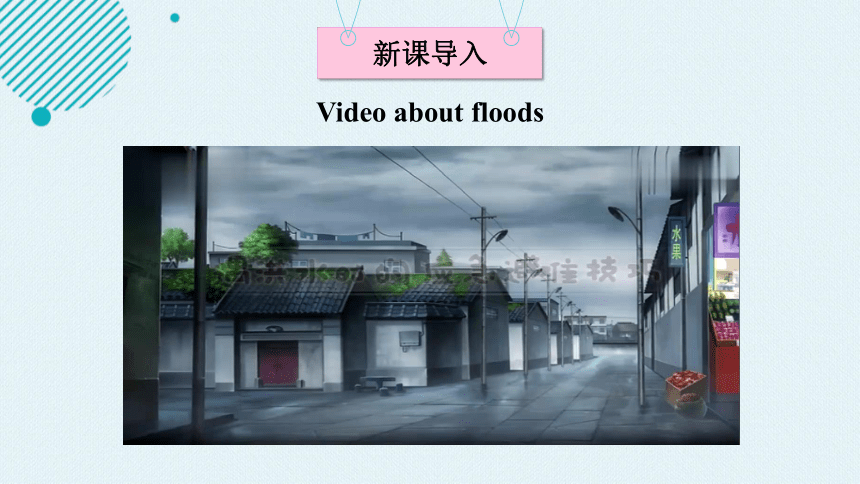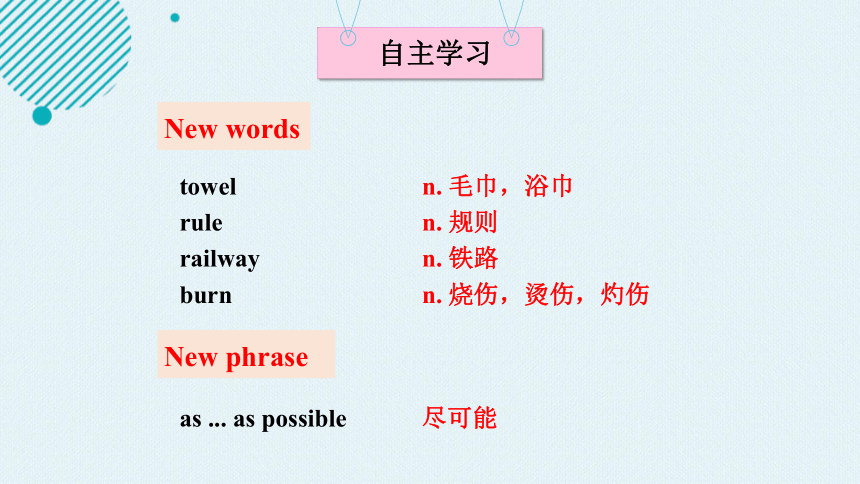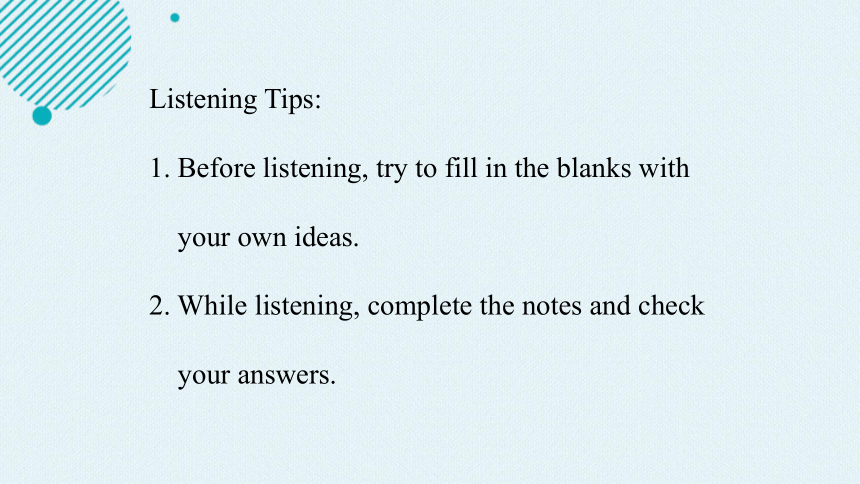Unit 8 Natural disasters Period 4 Integrated skills课件(共25张PPT) 牛津译林版八年级上册
文档属性
| 名称 | Unit 8 Natural disasters Period 4 Integrated skills课件(共25张PPT) 牛津译林版八年级上册 |

|
|
| 格式 | pptx | ||
| 文件大小 | 43.5MB | ||
| 资源类型 | 教案 | ||
| 版本资源 | 牛津译林版 | ||
| 科目 | 英语 | ||
| 更新时间 | 2024-08-06 00:00:00 | ||
图片预览









文档简介
(共25张PPT)
Unit 8
Natural disasters
Period 4
Integrated skills
1.学习目标
3.重点探究
2.自主学习
学习导航
5.当堂检测
6.课堂总结
4.拓展提升
新课导入
Video about floods
1. 能熟悉并正确运用本课时的重点单词和短语。
2. 能从听力材料中得到需要的信息,了解不同的
急救电话及急救措施。
3. 能用英语谈论急救措施。
学习目标
自主学习
New words
New phrase
as ... as possible
尽可能
towel
rule
railway
burn
n. 毛巾,浴巾
n. 规则
n. 铁路
n. 烧伤,烫伤,灼伤
重点探究
Free Talk
How many emergency telephone numbers do you know
119
120
110
122
A1. Which telephone numbers should you dial in the following situations Write the correct telephone number under each picture. The information in the box may help you.
110
119
122
120
110—Police 119—Fire 120—Hospital 122—Traffic
_______________ ___________________ _________________ ___________________
Free Talk
A:What should we do when there is..
B: We should …
A:What shouldn’t we do
B: We shouldn’t …
a fire
a flood
a traffic accident
an earthquake
Listening Tips:
1. Before listening, try to fill in the blanks with
your own ideas.
2. While listening, complete the notes and check
your answers.
A2. The students are attending a talk called “Away from danger” at Sunshine Hall. Listen to the talk and help Simon complete his notes.
Danger Tips
Try to get out as soon as possible.
Cover your mouth and nose with a wet towel to protect yourself from ____________.
Stay _____ to the ground.
Never ________ into the building on fire.
Fires
thick smoke
low
go back
Get to ______ ground and stay there.
Do not ______ through the flood water.
Danger Tips
Floods
high
walk
______ under a strong desk or table to protect yourself.
Do not stand near a __________.
Earthquakes
Hide
window
Always _______ traffic rules.
Look ______, right and then left when you cross the road.
Do not sit, ______ or ride your bicycle on railways.
Traffic accidents
follow
left
walk
Listening Tips:
1. Before listening, try to complete the diary entry
with the information in A2.
2. While listening, complete the diary and check
your answers.
A3. Simon's cousin Annie is asking Simon about the talk. Help him answer Annie's questions. Listen to the talk again and check your answers.
Annie: What did you learn from yesterday’s talk, Simon
Simon: We learnt a lot about keeping ourselves safe from fires,
floods, earthquakes and _______________.
Annie: Really What should we do if our building is on fire
Simon: We should try to _______ as soon as possible.
Annie: How can we protect ourselves from thick smoke
Simon: We should use a _________ to cover our mouth and
traffic accidents
get out
wet towel
nose and stay ______ to the ground.
Annie: Well, what should we do when there’s a flood
Simon: We should get to ____________. Remember that we shouldn’t
_______ through the flood water.
Annie: I see. What should we do when an earthquake happens
Simon: Hide under a ________ desk or table. Stay away from a
_________.
Annie: What should we do to protect ourselves from traffic accidents
Simon: We should always follow ___________. Moreover, it’s
dangerous to sit, walk or ride a bicycle on ________.
low
high ground
walk
strong
window
traffic rules
railways
B. Millie and Daniel are talking about first aid. Listen to the tape and answer the questions.
1. What may happen when we cook at home
2. What should we do first
We may burn our hands.
We should keep our hand in cold water for about ten minutes.
Millie: We may burn our hands when we cook at home. Do you know what to do first if I burn myself
Daniel: Sure. First, you should keep your hand in cold water for about ten minutes.
Millie: I see. What should I do after that
Daniel: Cover the burn with a clean towel.
Millie: Should I put any cream on it
Daniel: No, you shouldn't. You should go and see the doctor.
Millie: All right. Thanks.
Work in pairs and discuss what we should do first to deal with some accidents. Use the conversation below as a model.
A: We may ... when ... Do you know what to do first if ...
B: Sure. First, you should ...
A: I see. What should I do after that
B: ...
A: Should I ...
B: Yes, you should. / No, you shouldn't. You should ...
A: All right. Thanks.
Discussion
A stampede (踩踏) happened in Shanghai on Dec. 31st.
What should we do when it happens
1. We should calm down.
2. Tell others not to push.
3. Call the police for help.
4. Work together and help each other.
5. Protect our heart and head.
6. Don’t bend to pick up your shoes,
cellphone or wallet.
拓展提升
Language Points
1. Try to get out as soon as possible.
as ... as possible 尽可能……
e.g. We have to run as fast as possible.
我们得尽可能快得跑。
2. Cover your mouth and nose with a wet towel to protect
yourself from thick smoke.
cover ... with ... 用……覆盖/掩埋……
e.g. He covered his face with a wet cloth.
他用湿布捂住答脸。
protect ... from ... 保护……不受……
e.g. We should try our best to protect children from danger.
我们应该尽力保护儿童免受危害。
3. We learnt a lot about keeping ourselves safe from fires,
floods, earthquakes and traffic accidents.
keep sb. safe from ... 使某人的安全远离……
e.g. My parents always try to keep me safe from danger.
我的父母总是努力让我安全远离危险。
stay away from 远离;避开
e.g. My parents told me to stay away from her.
我父母让我不要接近她。
4. Stay away from a window.
5. Should I put any cream on it
put ... on ... 把……放在……上
e.g. Don't put the toys on your bed!
不要把你的玩具放在你的床上。
put on 穿上
e.g. She put on her coat and went out.
她穿上外套,出去了。
1. My mum wanted me to help her_______ (mop) the floor.
2. Mr. Xiao___________ (read) in the library when I called him last night.
3. It's really nice of you__________ (share) your umbrella with this little girl.
4. Who_______ (make) breakfast for you every morning in your home
5. When I met Miss Li in the street yesterday, I stopped_______ (talk) to her.
当堂检测
一、动词填空。
mop
was reading
to share
makes
to talk
二、翻译下列句子。
1. 用一条湿毛巾捂住你的嘴巴和鼻子。
2. 坐在铁路上是很危险的。
3. 如果房子着火了我们应该怎么做
4. 我们要遵守交通规则。
Cover your mouth and nose with a wet towel.
It’s very dangerous to sit on railways.
What should we do if our house is on fire
We should follow traffic rules.
课堂总结
Unit 8
Period 4
紧急求助电话机急救措施:
火警电话_____,急救电话______。
手烧伤的急救措施:
1. 把手放在________十分钟;
2. 把__________放在烧伤的地方;
3. 去看医生。
重点单词和短语:
towel, rule, railway, burn, as ... as possible, be on fire
119
120
冷水里
干净的毛巾
Unit 8
Natural disasters
Period 4
Integrated skills
1.学习目标
3.重点探究
2.自主学习
学习导航
5.当堂检测
6.课堂总结
4.拓展提升
新课导入
Video about floods
1. 能熟悉并正确运用本课时的重点单词和短语。
2. 能从听力材料中得到需要的信息,了解不同的
急救电话及急救措施。
3. 能用英语谈论急救措施。
学习目标
自主学习
New words
New phrase
as ... as possible
尽可能
towel
rule
railway
burn
n. 毛巾,浴巾
n. 规则
n. 铁路
n. 烧伤,烫伤,灼伤
重点探究
Free Talk
How many emergency telephone numbers do you know
119
120
110
122
A1. Which telephone numbers should you dial in the following situations Write the correct telephone number under each picture. The information in the box may help you.
110
119
122
120
110—Police 119—Fire 120—Hospital 122—Traffic
_______________ ___________________ _________________ ___________________
Free Talk
A:What should we do when there is..
B: We should …
A:What shouldn’t we do
B: We shouldn’t …
a fire
a flood
a traffic accident
an earthquake
Listening Tips:
1. Before listening, try to fill in the blanks with
your own ideas.
2. While listening, complete the notes and check
your answers.
A2. The students are attending a talk called “Away from danger” at Sunshine Hall. Listen to the talk and help Simon complete his notes.
Danger Tips
Try to get out as soon as possible.
Cover your mouth and nose with a wet towel to protect yourself from ____________.
Stay _____ to the ground.
Never ________ into the building on fire.
Fires
thick smoke
low
go back
Get to ______ ground and stay there.
Do not ______ through the flood water.
Danger Tips
Floods
high
walk
______ under a strong desk or table to protect yourself.
Do not stand near a __________.
Earthquakes
Hide
window
Always _______ traffic rules.
Look ______, right and then left when you cross the road.
Do not sit, ______ or ride your bicycle on railways.
Traffic accidents
follow
left
walk
Listening Tips:
1. Before listening, try to complete the diary entry
with the information in A2.
2. While listening, complete the diary and check
your answers.
A3. Simon's cousin Annie is asking Simon about the talk. Help him answer Annie's questions. Listen to the talk again and check your answers.
Annie: What did you learn from yesterday’s talk, Simon
Simon: We learnt a lot about keeping ourselves safe from fires,
floods, earthquakes and _______________.
Annie: Really What should we do if our building is on fire
Simon: We should try to _______ as soon as possible.
Annie: How can we protect ourselves from thick smoke
Simon: We should use a _________ to cover our mouth and
traffic accidents
get out
wet towel
nose and stay ______ to the ground.
Annie: Well, what should we do when there’s a flood
Simon: We should get to ____________. Remember that we shouldn’t
_______ through the flood water.
Annie: I see. What should we do when an earthquake happens
Simon: Hide under a ________ desk or table. Stay away from a
_________.
Annie: What should we do to protect ourselves from traffic accidents
Simon: We should always follow ___________. Moreover, it’s
dangerous to sit, walk or ride a bicycle on ________.
low
high ground
walk
strong
window
traffic rules
railways
B. Millie and Daniel are talking about first aid. Listen to the tape and answer the questions.
1. What may happen when we cook at home
2. What should we do first
We may burn our hands.
We should keep our hand in cold water for about ten minutes.
Millie: We may burn our hands when we cook at home. Do you know what to do first if I burn myself
Daniel: Sure. First, you should keep your hand in cold water for about ten minutes.
Millie: I see. What should I do after that
Daniel: Cover the burn with a clean towel.
Millie: Should I put any cream on it
Daniel: No, you shouldn't. You should go and see the doctor.
Millie: All right. Thanks.
Work in pairs and discuss what we should do first to deal with some accidents. Use the conversation below as a model.
A: We may ... when ... Do you know what to do first if ...
B: Sure. First, you should ...
A: I see. What should I do after that
B: ...
A: Should I ...
B: Yes, you should. / No, you shouldn't. You should ...
A: All right. Thanks.
Discussion
A stampede (踩踏) happened in Shanghai on Dec. 31st.
What should we do when it happens
1. We should calm down.
2. Tell others not to push.
3. Call the police for help.
4. Work together and help each other.
5. Protect our heart and head.
6. Don’t bend to pick up your shoes,
cellphone or wallet.
拓展提升
Language Points
1. Try to get out as soon as possible.
as ... as possible 尽可能……
e.g. We have to run as fast as possible.
我们得尽可能快得跑。
2. Cover your mouth and nose with a wet towel to protect
yourself from thick smoke.
cover ... with ... 用……覆盖/掩埋……
e.g. He covered his face with a wet cloth.
他用湿布捂住答脸。
protect ... from ... 保护……不受……
e.g. We should try our best to protect children from danger.
我们应该尽力保护儿童免受危害。
3. We learnt a lot about keeping ourselves safe from fires,
floods, earthquakes and traffic accidents.
keep sb. safe from ... 使某人的安全远离……
e.g. My parents always try to keep me safe from danger.
我的父母总是努力让我安全远离危险。
stay away from 远离;避开
e.g. My parents told me to stay away from her.
我父母让我不要接近她。
4. Stay away from a window.
5. Should I put any cream on it
put ... on ... 把……放在……上
e.g. Don't put the toys on your bed!
不要把你的玩具放在你的床上。
put on 穿上
e.g. She put on her coat and went out.
她穿上外套,出去了。
1. My mum wanted me to help her_______ (mop) the floor.
2. Mr. Xiao___________ (read) in the library when I called him last night.
3. It's really nice of you__________ (share) your umbrella with this little girl.
4. Who_______ (make) breakfast for you every morning in your home
5. When I met Miss Li in the street yesterday, I stopped_______ (talk) to her.
当堂检测
一、动词填空。
mop
was reading
to share
makes
to talk
二、翻译下列句子。
1. 用一条湿毛巾捂住你的嘴巴和鼻子。
2. 坐在铁路上是很危险的。
3. 如果房子着火了我们应该怎么做
4. 我们要遵守交通规则。
Cover your mouth and nose with a wet towel.
It’s very dangerous to sit on railways.
What should we do if our house is on fire
We should follow traffic rules.
课堂总结
Unit 8
Period 4
紧急求助电话机急救措施:
火警电话_____,急救电话______。
手烧伤的急救措施:
1. 把手放在________十分钟;
2. 把__________放在烧伤的地方;
3. 去看医生。
重点单词和短语:
towel, rule, railway, burn, as ... as possible, be on fire
119
120
冷水里
干净的毛巾
